Turkish President Recep Tayyip Erdoğan © Nrf
There is no doubt that Turkey’s President, Recep Tayyip Erdoğan, is an ambitious man, but is he ambitious for his country or for himself? Does anyone really know what his ultimate goal is? Does he? There is no doubt that he has caused huge ripples in his home waters and made Western governments sit up and take notice, mostly in some alarm. Erdoğan is known to be an admirer of the late Enver Pasha, who was Minister of War under the Ottomans during World War I.
It was he who, in 1918, created the “Islamic Army of the Caucasus” in order to drive out Armenian forces in the South Caucasus. His aim was to unite all Turkic nations in the entire region under the banner of Islam and to seize Azerbaijan’s lucrative oilfields at Baku. Enver became a lynchpin of regional politics around the Caspian Sea and Erdoğan would like to play a similar rôle today, but with greater power and on a far wider front. In today’s messy political picture, it’s not easy, although Erdoğan has certainly got the world’s attention.

Enver clearly caused some awkward readjustment of alliances: the Bolsheviks wanted to prevent the Ottoman Turks from getting their hands on Baku and its oil, so they did a deal with Germany to let them take the railway line and pipeline that ran from Baku to Batumi in exchange for recognising the independence of Georgia, albeit under a German protectorate. The Germans also got a proportion of the oil. The Turks abandoned their plans to take the railway and pipeline, concentrating instead on Baku, which was seized by the so-called “Army of Islam”. Armenia has long argued, with some pretty persuasive evidence to back the claim, that this led to the Turks massacring many Armenians as well as the Bolsheviks who were there at the time. Enver Pasha’s hopes, however, were dashed by the war coming to an end and by the resulting surrender of the Ottoman Empire. Turkey, of course, continues to deny allegations of a massacre by Ottoman forces.
It all looked so hopeful at the European Union summit in Helsinki, back in December 1999. It was extremely cold there and the conference venue hosted a massive ice sculpture to decorate its main entrance. We journalists, by and large, loved it, despite the outcome turning out to be yet another messy compromise (they usually are).
Things had changed for Turkey, however, for years always the bridesmaid and never the blushing bride. Its supposed aim of joining the Union
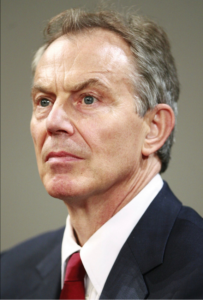
(genuine at the time) led to this statement in the summit’s official conclusions: “The European Council welcomes recent positive developments in Turkey as noted in the Commission’s progress report, as well as its intention to continue its reforms towards complying with the Copenhagen criteria. Turkey is a candidate State destined to join the Union on the basis of the same criteria as applied to the other candidate States.” The high hopes of a couple of decades ago have certainly faded since then, dwindling effectively to zero. In most places, the thaw in relations with Turkey was welcomed.
In his first House of Commons appearance after the Helsinki summit, the British Prime Minister Tony Blair said: “Turkey is of great strategic importance and an ally in NATO. A more constructive relationship between Turkey and the EU is long overdue, but we now have secured that. Turkey is now a candidate country, destined to join the European Union on the same basis as the other candidates.” To which it might be best to add the warning: “don’t hold your breath”.
At the time, everything looked hopeful. I recall how I and other journalists crowded around the entrance to the room in which the then Turkish Prime Minister, Bülent Ecevit, was being greeted by EU bigwigs. It had been a last-minute invitation and Ecevit arrived very late in the proceedings, looking somewhat shell-shocked, but we all wanted to share this supposedly historic moment.
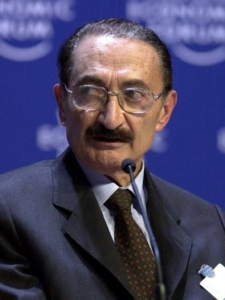
Ecevit himself issued a statement upon his return to Ankara. “The official recognition of Turkey’s candidate status for full-membership to the European Union is a landmark event not only for Europe,” he said, “but for the world as well. This candidacy, and in due time, full-membership to the European Union is Turkey’s birthright by virtue of Turkey’s historical development, its geography, and its present-day attributes as well as the provisions of the 1963 Association Agreement.” He also recalled what was, in reality, a rather disquieting fact: “Moreover, for the last four years, Turkey has been the only country to have effected a customs union with the European Union without becoming a full member.”
HISTORY REPEATING ITSELF
Erdoğan, however, is not like Ecevit, and relations between Turkey and the EU are no closer now than they were when that summit began, with the atmosphere as chilly as Helsinki’s ice sculpture. It still comes down, at least in part, to relations with Greece. It’s as if the Trojan hero Paris is still considered a hate figure for running off with the wife of the Spartan King Menelaus, the much-lauded (and supposedly lovely) Helen. Her face, it seems launched not only a thousand ships, as the old saying puts it, but also thousands of years of subsequent hatred and distrust. It was Manelaus’s brother, Agamemnon, king of Mycenae, who led the Greek invasion force into a Bronze Age war that supposedly lasted for ten years (nodding on towards 4,000).
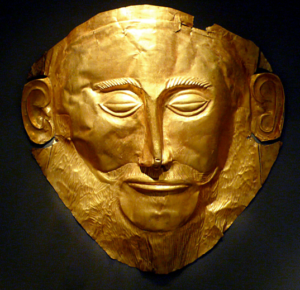
The Greeks and their EU partners, as well as the Turks, are still on the look-out for suspicious-looking wooden horses, it seems. It was, of course, Agamemnon’s Greeks who reportedly built the wooden horse, filled it with shock troops, then staged a pretended withdrawal to lull the Trojans into a false sense of security and into claiming the horse as a prize of war. Homer may have started the whole thing with his Iliad and then his Odyssey, about Odysseus’s journey home to Ithaca, (although the stories, as retold by professional story-tellers long before they were written down, were known to have been extant before Homer – if he existed – was born) but mankind’s willingness to hate, fight and kill ensures its endurance.
The Trojan war is still being fought in the realpolitik of today, whether or not any of it has a basis in truth. Today’s leaders might do well to recall the words of Homer in the The Iliad: “Hateful to me as the gates of Hades is that man who hides one thing in his heart and speaks another.” Yes, but that’s how politics works, isn’t it? We mustn’t underestimate or forget the importance of Homer’s deathless tale. In his book The Mighty Dead, the historian and author Adam Nicholson writes that in his view Homer dates from a millennium earlier than is generally reckoned and that the world he depicts is the result of a coming together of two ancient cultures: “His power and poetry derive not from the situation of a few emergent states in the eighth century Aegean,” Nicholson suggests, “but from a far bigger and more fundamental historic moment, in the centuries around 2,000 BC, when early Greek civilisation crystallised from the fusion of two very different worlds: the semi-nomadic , hero-based culture of the Eurasian steppes to the north and west of the Black Sea, and the sophisticated, authoritarian and literate cities and palaces of the Eastern Mediterranean.
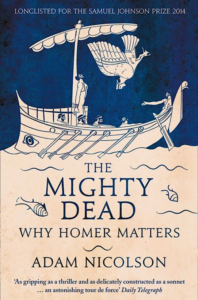
Greekness – and eventually Europeanness – emerged from the meeting and melding of those worlds.” Nicholson goes further in seeking to understand the continuing culture clash we see today. “Homer’s urgency,” he writes, “comes from the pain associated with that clash of worlds and his immediacy from the eternal principles at stake: what matters more, the individual or the community, the city or the hero?” Or could it even be, perhaps, the politician’s legacy?
Where does this leave Recep Tayyip Erdoğan? It’s not an easy question to answer. Certainly, he has Islamicised his country, wherever possible, but he has also presided over its economic decline. “Inflation is nearly 12%,” reports the BBC, “and the Turkish lira has slumped against the dollar. Coronavirus is exacerbating Turkey’s economic woes. When he became Turkish leader back in March 2003 the lira rate was 1.6 to the dollar – now it is above 8.0.” To retain his popularity among traditional Muslims, mainly in the country’s more rural areas, he oversaw the conversion of the Hagia Sophia, that beautiful and historic tourist magnet, into a functioning Mosque, much to the annoyance of Istanbul’s non-Muslim citizens.
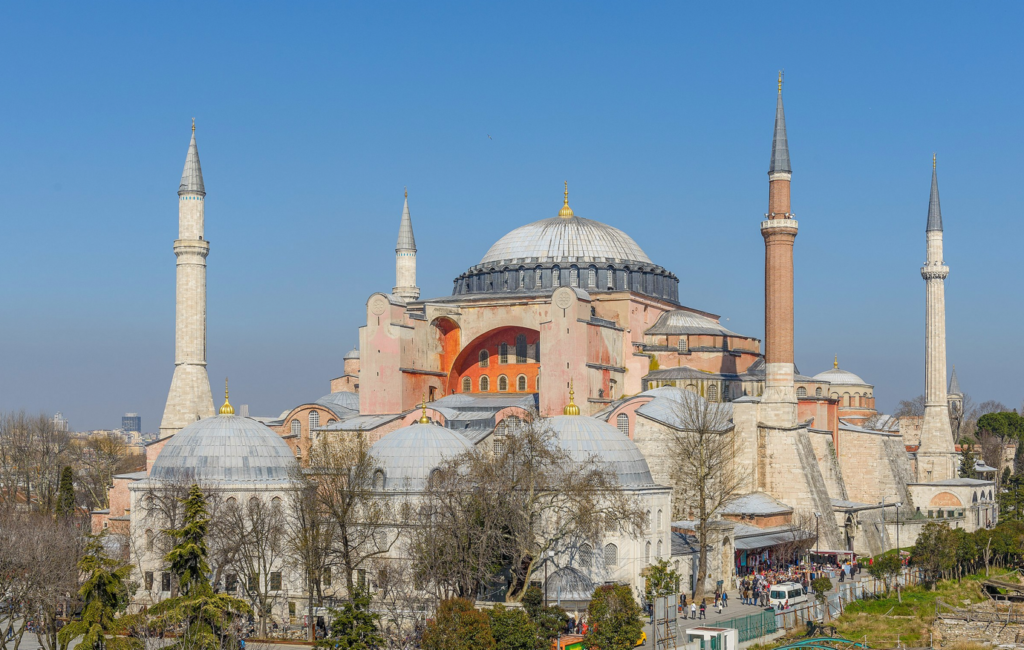
It was originally built as a Christian cathedral, then turned into a Mosque by the Ottomans before the country’s greatest moderniser, Kemal Attaturk, turned it into a museum. It was a museum when I visited it a few years ago and it is a stunning building, worthy of being seen by anyone with an interest in history and beautiful architecture.
NO CRYSTAL BALL
Erdoğan’s political fortunes have waxed and waned in unexpected ways. In 2020, his AKP party, which is a strongly Islamist creation, won local elections across Turkey – but not in Istanbul, Ankara and Izmir. Ankara matters most in theory, being the country’s capital city. Losing Istanbul, though, may come as the bitterest blow for Erdoğan: he was mayor of the city in the 1990s. He was elected prime minister in 2003, a position he held for 11 years before being elected in 2014 to what had been a purely ceremonial rôle: the presidency. Ceremonial it may have been once upon a time, but it certainly isn’t any more. It is now his power base and it’s one he has consolidated.
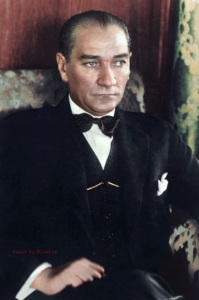
Mustafa Kemal Attaturk had banned the wearing of headscarves by Turkish women, in an attempt to modernise the country, but Erdoğan has reversed that ruling. He has also tried to establish “alcohol-free zones” and has told Turkish families to abandon any thoughts of family planning, arguing in 2016 that “We will multiply our descendants.” Women may not have had as much say in that as most in the West believe they should, either: he has strongly criticised feminism and has said that men and women cannot be treated equally.
With support for his party falling to 36%, according to polls, he has been examining ways of ensuring the political supremacy of his party and its allies. “We are starting extensive work regarding changing political party and election regulations,” he told the media, “to improve democratic participation.” However, the public are growing wary of his government and the odd slant the ruling party put on events such as the forest fires that destroyed buildings, including hotels and holiday accommodation in southern Turkey during a record heatwave. The government said the fires were started by the Kurdistan Workers’ Party (PKK), which is regarded as a terrorist group by both Turkey (or at least by its government) and the United States. However, they also criminalised an on-line group trying to raise money to rebuild, using the hashtag #HelpTurkey, with Erdoğan arguing that it made the government look weak, creating instead a rival website that praised the brave response of Erdoğan’s government and officials.
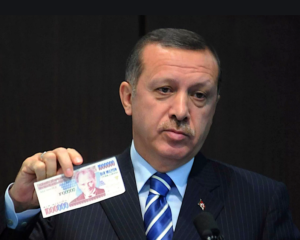
But in politics, it’s not always possible to predict the future in such a way as to allow for prompt and effective measures. For instance, inflation hit a 2-year high of 18.95% in July, largely driven by a rise in food inflation caused, at least in part, by the drought and high temperatures associated with climate change. It means that Turkey’s Central Bank was obliged to continue its ‘tight money’ policy until inflation comes down (as it is forecast to do). Erdoğan had hoped that a borrowing scheme he created would help stave off a slump in the value of the Turkish lira through domestic borrowing in gold and hard currency, but it failed to deliver the hoped-for results and also more than doubled what the Turkish Treasury would have paid if it had borrowed in liras instead.
It was Turkey that pushed at the Council of Europe for the so-called Istanbul Convention against domestic violence, which was opened for signature at the Council of Europe during Turkey’s presidency of the organisation in May 2011. It entered into force three years later, in August 2014, once ten countries had ratified it. The aim was to save women from being beaten up by their husbands or boyfriends. The Turkish government of the time lobbied hard for the Convention to be adopted, putting pressure on other member states. Now Erdoğan has withdrawn his country from it by presidential decree, following the wishes of his supporters who favour what they term “traditional family values” above a woman’s right not to be beaten up. According to his party, the sole purpose of a woman is to bear and raise her husband’s children. Domestic violence has soared in Turkey since Erdoğan came to power.
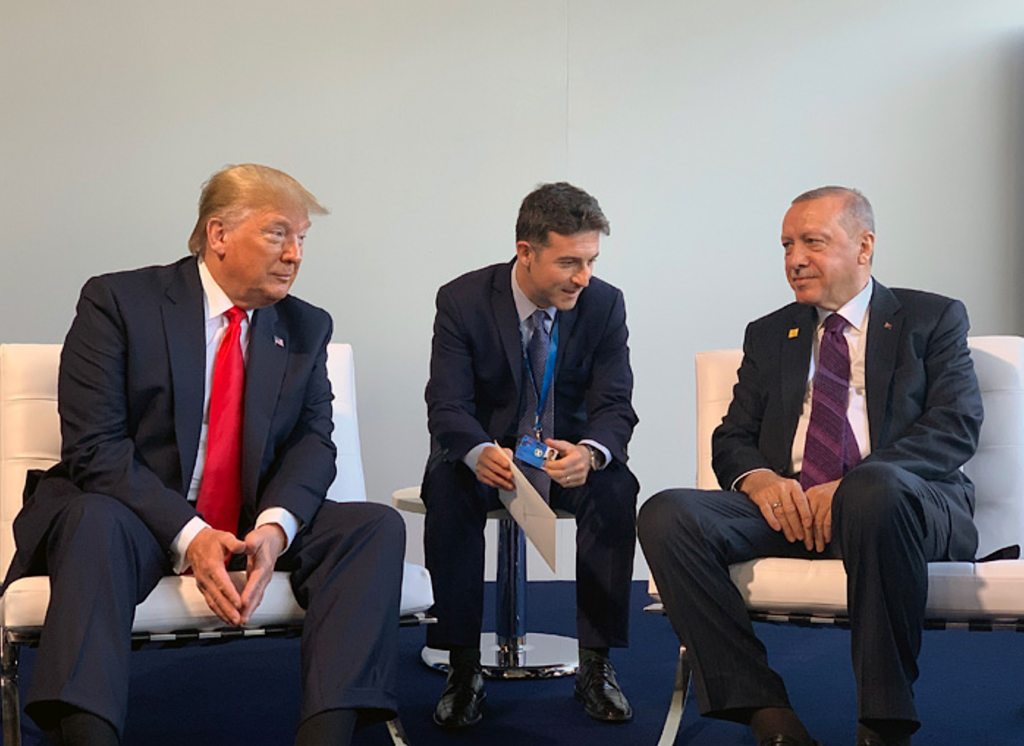
It would appear that he had counted on a victory for Donald Trump in the US elections and the appearance of Joe Biden in the White House is not to his liking, nor has it boosted his chances of retaining power when he comes up for re-election in 2023. Close observers claim that Erdoğan used to make mobile calls to Trump on the golf course during a game and viewed himself and the US president as members of a team of ‘strong presidents’ who could run the world and right its wrongs. He clearly has no such relationship with Biden.
NEW REALITIES
The question now arises of where exactly Erdoğan stands in relation to the victorious Taliban. Their victory over the United States has certainly strengthened their political hand (while weakening the mighty image of the US) and is unlikely to have caused too much distress inside the Turkish embassy. Erdoğan has already held his first talks with the Taliban in Kabul, and at a time when most countries are pulling out their diplomatic missions in Afghanistan, the Turkish embassy has gone back to its usual building in Kabul (it had been temporarily rehoused in a building at Kabul Airport), announcing that it will maintain its diplomatic presence.
Turkey has congratulated the Taliban on its “moderate” statements following the withdrawal of the US and its allies and said his government is open to working with the militant Islamists. Those ‘moderate’ statements have not been borne out in practice everywhere in Afghanistan. Erdoğan has made no mention of possible retaliation for the deadly suicide bombs near Kabul Airport.

Biden has vowed to retaliate, saying that he will ‘hunt down those responsible and make them pay’. In a speech at the White House, he told the media that the bombings were carried out by the Islamic State in Khorasan Province, ISKP (ISIS-K), ISIL’s affiliate in Afghanistan. Quoted on Al Jazeera, Biden said: “To those who carried out this attack, as well as anyone who wishes America harm, know this: We will not forgive; we will not forget. We will hunt you down and make you pay. I will defend our interests in our people with every measure at my command.” Given Turkey’s close proximity to Afghanistan and its diplomatic ties to the Taliban, Erdoğan seems unlikely to echo that sentiment. It goes without saying that Republican politicians are calling for Biden’s resignation (seemingly a daily occurrence) for the attack that no-one,including the most ardent Trump supporters, foresaw.
According to Al Jazeera, ISKP had claimed responsibility for the attack in a statement that identified the bomber by name and referred to the Taliban as “apostates”. ISKP seems to regard the Taliban as not severe enough in their application of Sharia law. It’s doubtful if many Afghan women would see it that way, but there again ISKP doesn’t seem to regard the opinions of women as being a matter of concern. US forces are said to be coordinating with the Taliban to address the “extremely real” threat of further attacks by the extremists. Al Jazeera pointed out that Bob Menendez, the Democratic chair of the Senate Foreign Relations Committee, had previously warned against trusting the Taliban. “As we wait for more details to come in, one thing is clear: We can’t trust the Taliban with Americans’ security,” Menendez wrote in a Tweet. Biden defended working with the Taliban as a matter of expedience, rather than trust.
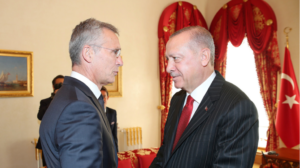
Turkey, which is part of the NATO mission, had been responsible for security at the airport for the last six years. “We have held our first talks with the Taliban, which lasted three-and-a-half hours,” Erdoğan said, adding that: “If necessary, we will have the opportunity to hold such talks again.” Meanwhile, two officials said Turkey will not help to run Kabul airport now that NATO has pulled out unless the Taliban agree to a Turkish security presence, following the suicide bombings outside the airport. That seems unlikely. However, there are advantages to be sought for Erdoğan in the current chaos, especially as Turkey comes under increased scrutiny from its NATO colleagues for its record in Libya, Iraq and Syria. The news website FirstPost says that: “Erdoğan is also cozying up to the Taliban in an attempt to limit the flow of irregular migrants to Turkey.” Turkish Foreign Minister Mevlut Cavusoglu has already said that Turkey cannot be responsible in the event of a new wave of migrants from Afghanistan. Addressing the media, Cavusoglu had said, “As Turkey, we have sufficiently carried out our moral and humanitarian responsibilities regarding migration. It is out of the question for us to take an additional refugee burden.” Turkey already hosts around 3.7-million Syrian refugees, bringing the world’s largest refugee population to 4.9-million, in addition to about 300,000 Afghans. It has been reinforcing its measures along its eastern border to prevent further crossings in anticipation of a new migrant wave from Afghanistan. Anti-migrant sentiment is running high in Turkey and Erdoğan wants to seize the opportunity with the Taliban to block this migration and help boost his image as well as his popularity among his own people. He also hopes that a strong presence in Afghanistan will help him to balance his diplomatic efforts with Iran, Pakistan and Saudi Arabia.
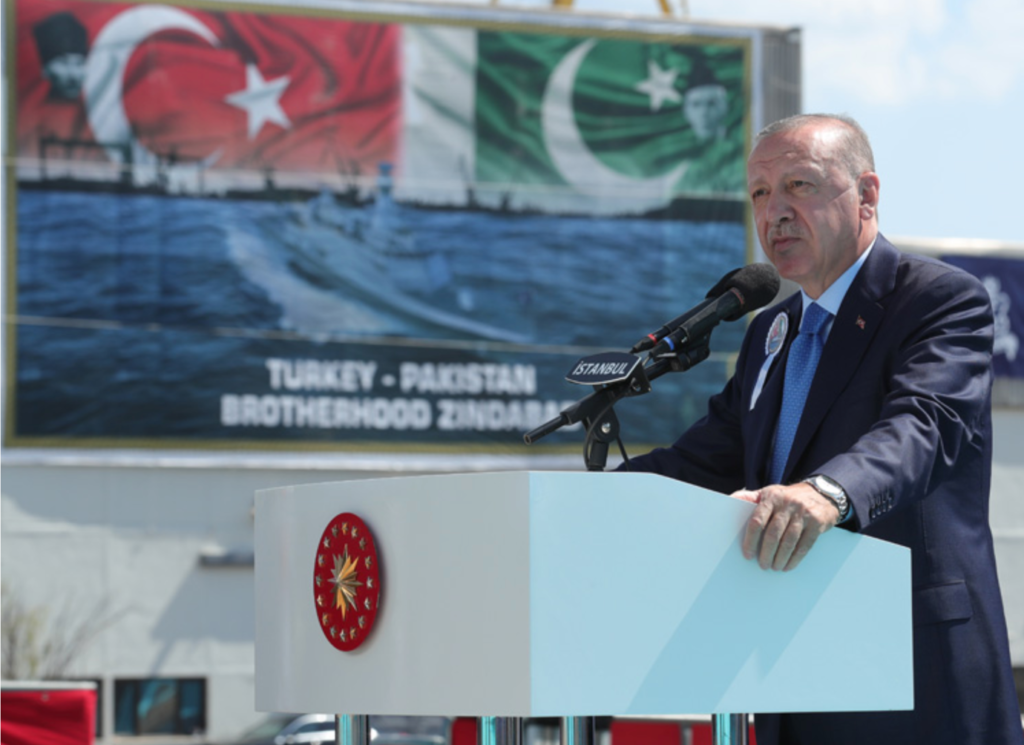
All of this does not mean, of course, that Erdoğan trusts the Taliban. “The Taliban’s statements have been moderate but doubts still persist,” Erdoğan told the media while stressing that Ankara is ready to provide various types of support to Afghanistan. Speaking to the media, he underlined that Turkey’s main concern in Afghanistan is to ensure the country’s quick recovery. “We have given Afghanistan all kinds of support, including infrastructure and superstructure for 10 years,” he said. “However, the Taliban have caused serious damage in the north of Afghanistan,” hinting that any sort of help offered or given to Afghanistan may be predicated upon doors being opened for Turkey. Somewhat ironically, it could be argued, he suggested that Turkey could help Afghanistan over the issue of women’s rights. “Regarding Afghan women, we see them as we see the women in our country,” he told the media, “and can take steps for Afghan women to live with the same rights. But, as you know, we cannot evaluate the conditions in Afghanistan the same as in Turkey.” No-one seems quite sure what that means, exactly.
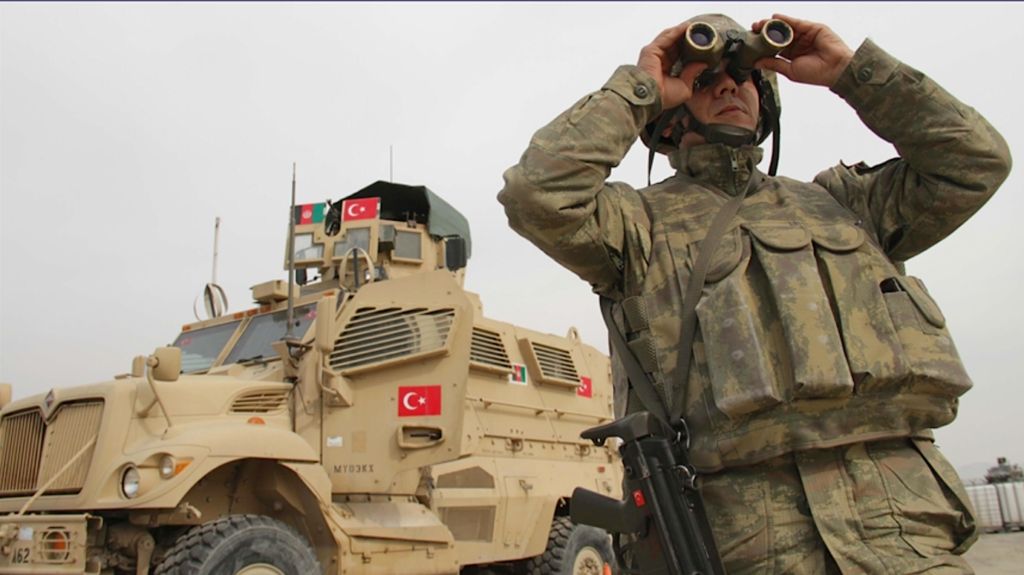
Turkey had more than 500 non-combatant troops stationed in Afghanistan as part of NATO’s now-abandoned mission there. Turkey has been in the country for two decades and has been involved in consultancy efforts, reconstruction, and maintenance, as well as operating the airport. According to Turkish officials, the Taliban have asked Turkey for ‘technical help’ to run the airport after the foreign forces have left but had insisted that Ankara’s military also withdraw, along with US forces and their allies, by the end of August deadline. The Taliban said that they would take over security of the airport itself. Taliban spokesperson Zabiullah Mujahid said the group sought ‘good ties’ with Ankara. “We want good relations with Turkey, the Turkish government and the Muslim people of the Turkish nation,” he said. “As for Turkish forces stationed in Afghanistan, we are not in need of them in our country and once the evacuation is completed, we will secure the airport by ourselves”.
PUBLIC RELATIONS
The Taliban has been trying to get across a new image for itself since its forces marched into Kabul and took control of Afghanistan. The behaviour of its more militant members, however, has fallen well short of the promises. A Taliban spokesperson vowed that no one would be harmed in Afghanistan, but within a day, Taliban militants had opened fire on a protest in Jalalabad against their rule, killing at least three people. There have also been reports on The Insider website of Taliban militants harassing people as they made their way to the airport in Kabul, despite promising to provide a safe passage to civilians. The UN’s refugee agency, the UNHCR, points out that Turkey has legal obligations towards migrants: “The Republic of Turkey is a party to the 1951 Refugee Convention and 1967 Protocol,” the UNHCR website explains, “maintaining the geographical limitation to the 1951 Convention, thus retaining resettlement to a third country as the most preferred durable solution for refugees (who have) arrived due to the events occurred outside of Europe.”
According to Al Jazeera, the refugee situation in Turkey is at crisis point, leading some local leaders to take unusual steps to stem the flow. “When a mayor in Turkey’s northwest this week announced plans to charge “foreigners” 10 times more for water and waste services, his words were applauded by many across the country,” the website says, somewhat worryingly.
Turkish President Erdogan meets with NATO Secretary-General Jens Stoltenberg
Tanju Ozcan, the mayor of Bolu who comes from the opposition Republican People’s Party (CHP), explained that his comments referred solely to refugees. “This hospitality has gone on too long,” He told Al Jazeera, adding that Turkey had “become a dump for migrants”. It’s not only Turkey, of course, that is concerned about the threat of further mass migration. Ali Hekmat, co-founder of the Afghan Refugee Solidarity Association based in Kayseri in central Turkey, said many new arrivals were people who had worked for the Kabul government or foreign organisations and who had the most to fear from a Taliban takeover. Meanwhile, the EU, whose deal with Turkey saw millions of Syrian refugees settle there instead of pressing on into Europe, is getting nervous. It’s increasingly clear that most Turks would rather the refugees went away, perhaps even to the very places they had hoped to reach in the first place. You may recall that back in 2016, Turkey agreed to accept the Syrian refugees heading for Europe, in return for EU concessions and €6-billion euros in aid to help them cope with the Syrians.
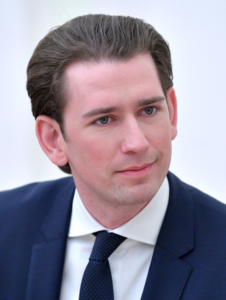
The situation has not been helped by comments made by the Austrian Chancellor, Sebastian Kurz, who said that “states like Turkey” are definitely a better destination for refugees than Austria, Germany or Sweden. It drew a comment from Turkey’s Foreign Ministry to the effect that: “Turkey will not take a new wave of migration.” Austria’s neighbours may be wishing that Mr. Kurz had kept his mouth shut.
Turkey is keen to deflect a possible wave of migrants entering through Iran. They are unlikely to want to stay there because of their preferred branch of Islam, which differs from Afghanistan’s Sunni branch. One Turkish woman, Randa Habib, told the world what’s happening in a Tweet. With a photograph to support what her words, she said “Turkey is building a wall along its border with Iran to prevent a new influx of refugees, mainly from #Afghanistan as the Taliban take over the country. For now, a 5km section is under construction but Turkey is aiming to build a 295km-long wall.” The website InfoMigrants doesn’t think it’s having the deterrent effect that Turkey clearly hoped for: “On the border between Iran and Turkey, a new wall has been built to deter migrants from crossing irregularly. Yet some manage to sneak around it at night — the only traces the migrants leave are empty bottles or fresh footprints, AFP reports. Turkish armored vehicles patrol the border in the early morning hours.”

InfoMigrants is a news and information site for migrants to counter misinformation at every point of their journey: in their country of origin, along the route, or in the places where they hope to start a new life. InfoMigrants is available in five languages: French, Arabic, English, Dari and Pashto. InfoMigrants is a collaboration led by three major European media sources: France Médias Monde (France 24, Radio France International, Monte Carlo Doualiya), the German public broadcaster Deutsche Welle, and the Italian press agency ANSA. InfoMigrants is co-financed by the European Union.
It looks disturbingly like a huge pot that is coming towards the boil with a lid firmly fastened down and no safety valve. An explosion is inevitable, yet many EU politicians would seem to be sitting on their hands with their eyes tightly closed and humming loudly so that they won’t hear anything they’d rather not. For Erdoğan, of course, the EU’s problems are of little concern. Perhaps he has studied the works of Niccolò Machiavelli, the Renaissance diplomat of 15th to 16th century Florence, who wrote in his famous guide for leaders, ‘The Prince’: “Everyone realises how praiseworthy it is for a prince to honour his word and to be straightforward rather than crafty in his dealings; none the less, contemporary experience shows that princes who have achieved great things have been those who have given their word lightly, who have known how to trick men with their cunning, and who, in the end, have overcome those abiding by honest principles.”
It’s all very cunning, if you’re interested in discovering who, in the great political machine that is Europe, is winning or losing. The biggest losers, of course, are the refugees themselves, while Europe’s political masters squabble over who is doing most and who should be doing more to ease the current crisis. As to how well the various competing political voices are faring, it’s not easy to tell. As Al Jazeera points out: “European politicians have done relatively little to help Afghans in view of their moral responsibility for their plight. France and the United Kingdom have gone only as far as proposing the creation of a United Nations-run safe zone in Kabul for those wanting to flee Taliban rule, while Ursula von der Leyen, the president of the European Commission, has said evacuations, immediate humanitarian aid, longer-term development aid were discussed at a G7 meeting.” French President Emmanuel Macron told a meeting in August that France should ‘anticipate and protect itself from a wave of migrants’ from Afghanistan. Of course, he faces an election in May 2022.
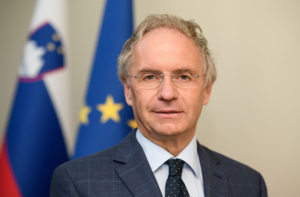
EU leaders are in rare agreement with each other, according to Al Jazeera: “The European Union ministers of home affairs expressed similar concerns during their extraordinary meeting on the situation in Afghanistan on August 31. They made it clear that their main priority is preventing ‘illegal immigration’.” The ministers issued a statement after the meeting, in which they made clear their determination to avoid an influx of refugees: “Based on lessons learned, the EU and its Member States stand determined to act jointly to prevent the recurrence of uncontrolled large-scale illegal migration movements faced in the past, by preparing a coordinated and orderly response. Incentives to illegal migration should be avoided.” In other words, “migrants not welcome”. Statements by individual ministers and leaders have been perilously close to those coming from Europe’s parties of the far right, never famed for their humanitarianism. Aleš Hojs, Slovenia’s Minister of the Interior said: “I am very pleased that today we have shown unity and agreed a joint statement on the EU’s common response to the situation in Afghanistan. The EU remains committed to support vulnerable Afghans, and in particular, women and children, both in Afghanistan and in the region. At the same time, we are determined to prevent smugglers and human traffickers from exploiting this dire situation by coordinating our response to any illegal migration movements and protecting the EU external borders.”
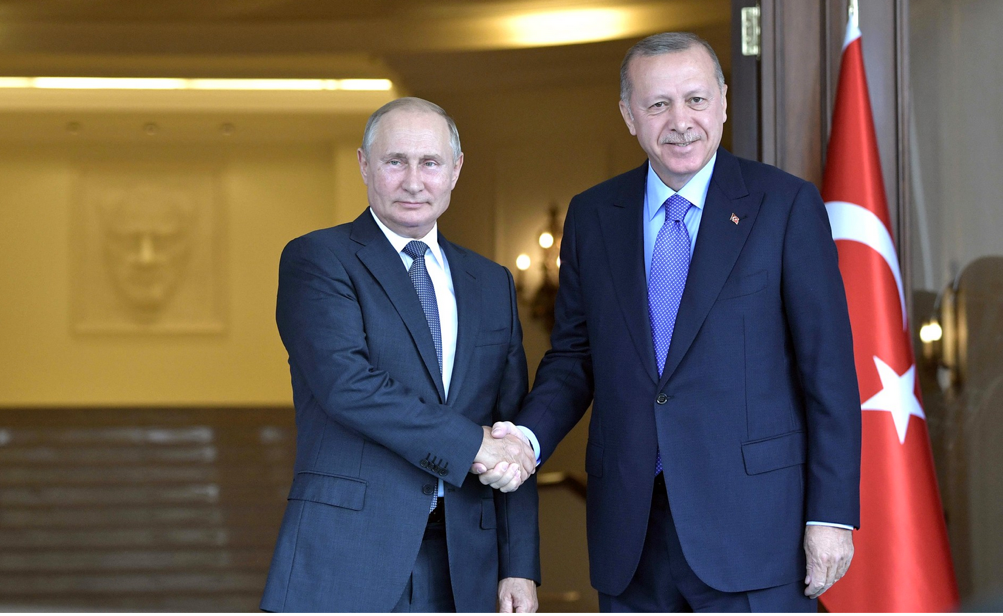
“Exporting the migration crisis to third countries and adopting anti-migrant rhetoric may provide quick political gains for European leaders,” says a clearly angry piece on the Al Jazeera website. “But such strategies, as seen many times in the recent past, will not pay off in the long run. Attempts to build ‘Fortress Europe’ does not keep the EU safe and prosperous, but instead fuels ethnonationalism and hate within the bloc’s borders. Moreover, it isolates Europe from the rest of the world.” Welcome to the new Europe: locked doors, chained gates and large “Keep Out!” signs included. I’m not sure former Commission President and committed humanitarian Jacques Delors would recognise it. It looks increasingly, however, like a world in which Recep Tayyip Erdoğan is likely to feel very much at home.

